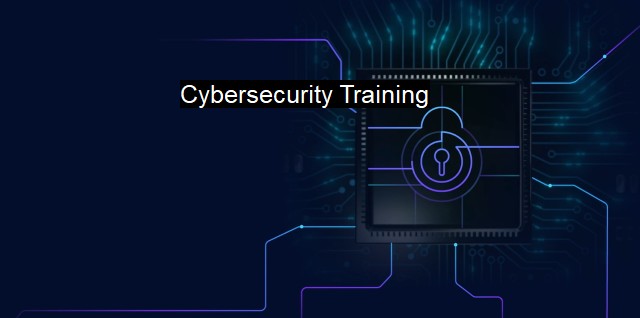What is Cybersecurity Training?
Staying Safe and Secure in a Connected World: The Importance of Cybersecurity Training for Individuals and Organizations
Cybersecurity training is an educational program provided to employees, managers, and executives to understand the risks associated with cyber-attacks and how such dangers can be mitigated. It equips them with the necessary knowledge and skills to efficiently thwart cyber threats and maintain a strong security posture. This training often is tailored to address the specific needs of various departments within an organization. It also includes providing the knowledge of various federal and regional cybersecurity regulations, like HIPAA, GDPR or CCPA.Cybersecurity training ranges from a simple introduction to cybersecurity practices and terms to deep technical knowledge including threat detection and mitigation techniques. It can encompass a variety of areas such as data protection, securing information systems, using secure internet practices, malware prevention, and understanding various forms of cyber threats and attacks.
One fundamental part of cybersecurity training is to educate employees about their roles in preventing cyber-attacks. This involves training on recognizing phishing emails, suspicious links, and malicious attachments. As trained individuals can act as the first line of defense, this awareness significantly limits the potential for cyber-attacks on organizations. This is crucial since many attacks target the human factor, exploiting unawareness and negligence.
Another important aspect of cybersecurity training is providing technical skills to IT professionals enabling them to effectively defend against evolving cyber threats. These skills include Network Security, intrusion detection, firewall utilization, encryption methods, and the secure applications development.
Cybersecurity training includes instruction about various forms of malware such as viruses, worms, trojans, ransomware, and spyware. Understanding how these threats operate can empower individuals to better maintain digital hygiene and system security. The knowledge also extends to understanding the ramifications of these attacks, such as data theft or loss, damage to the system, financial loss, and the long-term impacts on trust and reputation.
The training also typically covers the appropriate response to a cyber-attack. It includes good practices like reporting the incident immediately, isolating the compromised device or system, and initiating recovery procedures. It fosters procedures for restricting the extent of damages and helps in swift recovery from an incident, minimizing potential losses.
Cybersecurity training plays a key role in ensuring compliance and address amplifying regulations worldwide that require both awareness and defense solutions for cyber threats. Violations of these regulations can lead to severe fines, reputation damage, and loss of customer trust.
Cybersecurity training equips organizations to face increasingly sophisticated and prevalent attacks. It opens up a forum for individuals across an organization - from executives to lower-level employees - to discuss potential cybersecurity risks and collaborate on forming a resilient security posture. This could result in a shift from a siloed to a united approach against cyber threats, further strengthening the organization's defense.
Thus, it is clear that cybersecurity training is vital to avoid falling into the traps of cyber criminals. It bestows knowledge, skills, awareness, and most importantly, confidence to stay resilient in the face of cyber threats. Today’s digitalized world requires a deep understanding of cyber risk landscapes and the know-how to protect and respond appropriately, all of which cybersecurity training provides.
The importance of hygiene and well-being is well recognized in physical terms, so it should come as no surprise that the same principles apply in the digital realm. Cybersecurity training hence plays a similar role, ensuring the health and integrity of systems, data, and ultimately the organization itself.

Cybersecurity Training FAQs
What is cybersecurity training and why is it important?
Cybersecurity training is the process of educating individuals or organizations on how to protect their computer systems, networks, and sensitive information from cyber attacks. It is important because cyber threats are constantly growing and evolving and pose a significant risk to individuals, businesses, and governments. Cybersecurity training helps individuals and organizations stay informed about the latest threats and best practices for preventing cyber attacks.What topics are typically covered in cybersecurity training?
Cybersecurity training typically covers a range of topics including basic security principles, how to identify and prevent common cyber threats such as phishing attacks and malware infections, the importance of strong passwords, and best practices for network security. It may also cover more advanced topics such as cryptography, threat intelligence, and incident response.Who should undergo cybersecurity training?
Anyone who uses a computer or mobile device and has access to sensitive information should undergo cybersecurity training. This includes employees of companies, government agencies, and non-profits, as well as individual computer users. Cybersecurity training should be customized to the specific needs of the individual or organization, and should be regularly updated to address new threats as they emerge.What are some benefits of cybersecurity training for businesses?
Cybersecurity training for businesses can help reduce the risk of data breaches and cyber attacks, which can result in significant financial losses and damage to the company's reputation. It can also help ensure compliance with data protection regulations and industry standards. Additionally, cybersecurity training can help foster a culture of security within the organization, where employees understand the importance of protecting sensitive information and are more vigilant about potential threats.| | A | | | B | | | C | | | D | | | E | | | F | | | G | | | H | | | I | | | J | | | K | | | L | | | M | |
| | N | | | O | | | P | | | Q | | | R | | | S | | | T | | | U | | | V | | | W | | | X | | | Y | | | Z | |
| | 1 | | | 2 | | | 3 | | | 4 | | | 7 | | | 8 | | |||||||